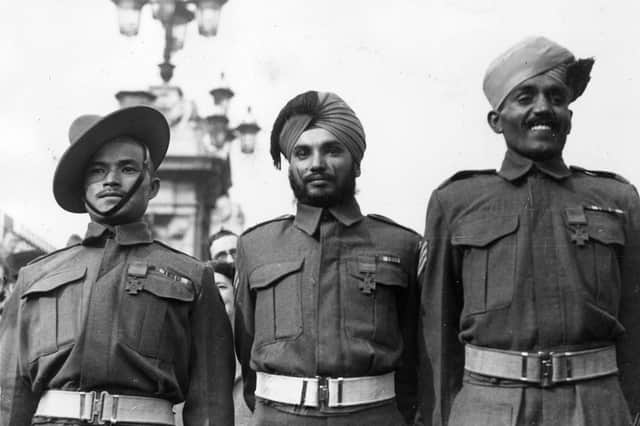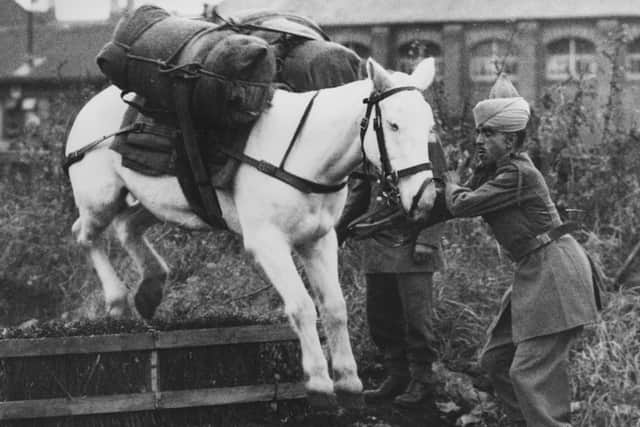Remembrance Sunday: Scotland has no memorial to the fallen of the British Indian Army. It's time to recognise their sacrifice – Ravinder Kaur Nijjar
This article contains affiliate links. We may earn a small commission on items purchased through this article, but that does not affect our editorial judgement.


After the disruption caused by Covid to events in 2020, and the loss of so many from our older generation, Remembrance Sunday will be especially poignant this year.
When dignitaries pay their respects by laying a wreath, they will be commemorating soldiers who made the ultimate sacrifice.
Advertisement
Hide AdAdvertisement
Hide AdBut while those from the British Indian Army, which included Sikhs, Hindus, Muslims and Gurkhas amongst others, may be remembered in areas where the population is more diverse, in many parts of the UK those brave soldiers have been forgotten.
There is nowhere in Scotland that commemorates the contribution and role of these soldiers who travelled halfway around the world from the Indian subcontinent to fight to free Europe.
The British Indian Army contributed 1.5 million servicemen in the First World War and 2.5 million in the Second World War. In the two world wars, 83,005 Sikh soldiers were killed and 109,045 were wounded.
These men have been forgotten, yet without them the Allies may never have defeated Nazism. For decades, the voices of those soldiers and their descendants – along with those from elsewhere in the Commonwealth – have not been heard.


Nowhere are there any images or stories of these soldiers in the history books. During my own school history lessons, there were no references to the contribution of the British Indian Army soldiers during the two World Wars. That must change.
For many Scottish Asians, those brave men who came to Britain’s aid were husbands, uncles, fathers, grandfathers, and great grandfathers. For the Sikhs who answered the Allies’ call in that war, it went to the heart of their faith to fight against tyranny and oppression anywhere in the world.
An initiated (baptised) Sikh is to be a saint/soldier, a guardian of a righteous world. He or she must develop the virtues of a saint – love, compassion, humility, selflessness – but also have virtues of courage and bravery to protect and become a guardian of the whole of humanity.
So many thousands of Sikhs signed up and made the ultimate sacrifice far from their homes. My own father-in-law Jagat Singh Nijjar arrived in Glasgow in 1938 and worked in Bishopton, at the Royal Ordinance factory. He contributed to the war effort by helping to manufacture munitions. He died in 1964 aged 59 from leukaemia after years of working with ammunition powder that poisoned his lungs.
Advertisement
Hide AdAdvertisement
Hide AdMy daughter-in-law’s grandfather Ajmer Singh Jhajj was a prisoner of war in Germany who survived the war. The son of Naik Gian Singh, who was awarded the Victoria Cross in the Second World War, lives in Glasgow.
In May 2021, the Sikh Second World War veteran Darbara Singh Bhullar passed away in Glasgow aged 98. He fought in the Burma campaign against Japan in the Indian Signal Corps for the British Indian Army.
Scotland also has a special connection with the British Indian Army through an Indian Muslim regiment from the Punjab called Force K6, who were a mule transport corps during the Second World War, with 13 members buried here.
Our forefathers sacrificed so much so that we could live in a more peaceful world. Their contribution not only went unrecognised in the UK, but also in India and Pakistan. These men have been lost in the ether of time.
In the 1980s, I started teaching and spent many years working in the multi-cultural/anti-racist education field. Over three decades, I feel little has changed.
Racism has become more covert, although the experience of England’s footballers this summer would suggest otherwise.
Many people of colour have heard the phrase “go home” at some point in their life. But the wider community forgets that this is our home, and that forefathers helped create the freedom that we all enjoy.
It’s time to make amends by commemorating the colourful heritage of Scotland.
Advertisement
Hide AdAdvertisement
Hide AdFor many years, individual faith communities have been asking for dedicated memorials to remember their loved ones but sometimes when voices join together much can be achieved. The charity Colourful Heritage has been working over recent years to establish Scotland’s first permanent memorial to the British Indian Army.
A memorial to commemorate Sikhs, Muslims, Hindus, Christians, Gurkhas and people of other faiths and none. I am proud to be a member of the working group exploring the proposal for a permanent memorial in Scotland, together with faith representatives, politicians and members of the Armed Forces.
The memorial will serve as both an educational and commemorative tool providing information and stories of some of the 160,000 British Indian Army soldiers who lost their lives.
The most likely location is in the grounds of Kelvingrove Art Gallery and Museum. But why should these soldiers be commemorated at a different time or place from British soldiers? On the battlefield, they weren’t treated as second-class citizens; they were brothers-in-arms. But they have been treated as second-class when it comes to their legacy for too long.
So, while the Cenotaph has its Christian symbolism, I have been asking the question, why can’t George Square also have a memorial for other faiths?
Shouldn’t all those who lost their lives fighting for our freedom be remembered together? We must not forget that the whole of humanity is interdependent and interconnected and any adversity or conflict cannot be overcome by one nation alone.
Why would anyone not want to commemorate their sacrifice? That is the question I hope we can all ask ourselves.
Ravinder Kaur Nijjar is a member of the Colourful Heritage working group for the British Indian Army memorial project, adviser to Sikhs in Scotland, and chair of Religions for Peace UK Women of Faith Network
A message from the Editor:
Thank you for reading this article. We're more reliant on your support than ever as the shift in consumer habits brought about by coronavirus impacts our advertisers.
If you haven't already, please consider supporting our trusted, fact-checked journalism by taking out a digital subscription.
Comments
Want to join the conversation? Please or to comment on this article.
